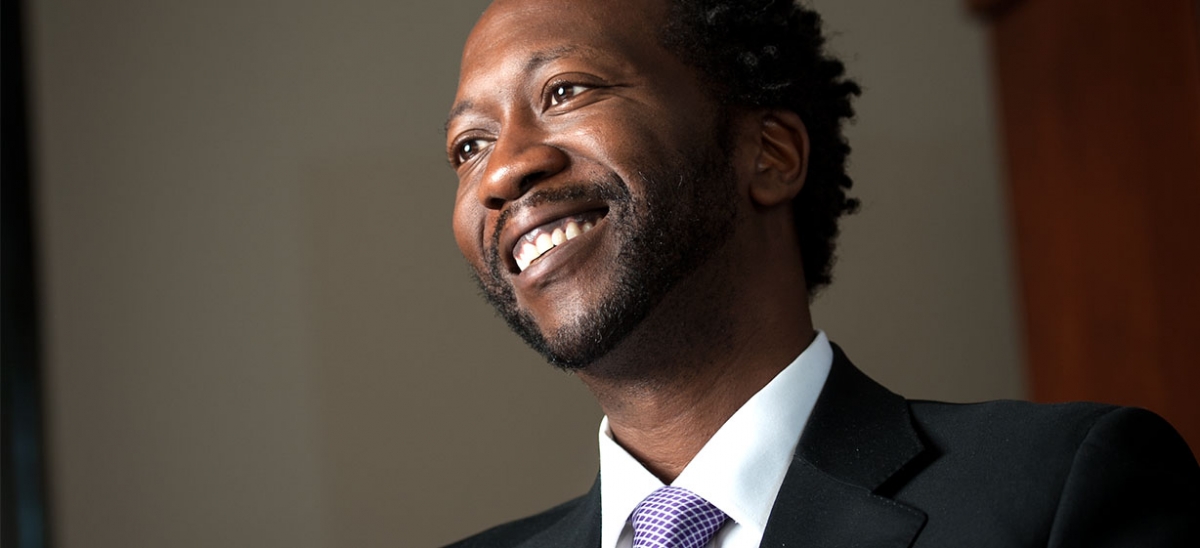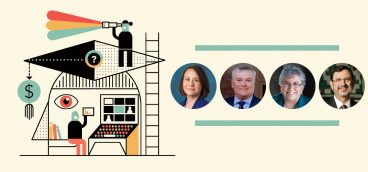Raising the Bar

Going to law school as a get-rich plan?
Maybe you’ve come to the wrong place.
That’s the message the University of Pittsburgh’s new law school dean, William M. “Chip” Carter Jr., relays to incoming students or existing ones seeking guidance.
This is no cliché in Carter’s mind: The law is a calling. He’s serious, driven and extremely convincing about that fact.
“It was always a trope that law school was a golden ticket and that it would lead immediately to a $160,000 salary for every 25-year-old graduate, whereby they will live what the kids call a ‘models and bottles’ lifestyle,” Carter told Pittsburgh Quarterly. “That just is not the law. What the law has always been is a livable calling—a profession in which you can do good on behalf of your clients first, society second and we, as lawyers, we come third in that equation.”
Carter, 41, arrived at Pitt Law in July from Temple University’s Beasley School of Law, where he was a professor for five years. A Cleveland native, he also taught at Case Western Reserve University’s School of Law, where he earned a juris doctor magnum cum laude in 1998; he practiced at the Washington, D.C., law firms of Ropes & Gray and Squire, Sanders & Dempsey.
He has lectured and been published on issues of constitutional law, civil rights and other facets of equality law. Case Western’s law school named Carter professor of the year for three consecutive years.
After a search firm piqued his interest in Pitt, he immediately connected with the faculty, urban campus setting and region before accepting the job. He, his wife and two daughters, 8 and 5, settled in Squirrel Hill and quickly acclimated.
“We’re having a great transition,” Carter said. “And Pitt really felt like a place where I could really make a positive difference in terms of a shared vision for moving forward. There are a lot of changes and challenges going on in legal education, and I think Pitt is well positioned to respond to them.”
Among the challenges: Nationally, law school applications have declined over the past two years and many graduates are not finding employment in legal fields.
“There’s been a whole lot of negative press over the past couple years about law schools—whether law schools are worth it,” Carter said, “whether they actually teach anything practical, whether they are a scam. So there’s kind of an intangible challenge that law schools are undergoing as well.”
Rising debt levels for law students combined with not as many job opportunities for graduates have changed the game, maybe forever. “The message is that change is here, not that change is coming,” Carter said. “We as faculty have to change, and we are doing so. For a prospective law student, you want to be thoughtful about what you want to do and you want to educate yourself about the kind of school that is going to position you to do it and do it well.
“If your expectation is that in this market law school will be the brass ring with the golden ticket to a fabulous life of wealth, you are mistaken.”
Carter is searching for serious, driven students. He laid out his vision for Pitt’s law school in four categories: innovation, integration, access and excellence.
For example, he described innovation in part as teaching students how to adapt to the emerging technology space in Pittsburgh and other similar markets.
“We need to train students to see how they can work with entrepreneurs as lawyers and also think as an entrepreneur as a lawyer,” Carter said. “Because clients these days are demanding a greater degree of legal sophistication, beyond simply the knowledge of legal doctrine.”
Carter spoke of access as diversity, but not in the traditional sense of race and gender, although he deems those issues important as well. “This is a public university and, of course, we want the high-level students,” he said. “But the mission of a public university should be to create a truly diverse student body. The son or daughter of a firefighter who wants to get a legal education, there needs to be a place for that person here. The school teacher who wants to transition to a new career, there needs to be a place for that person here. Not all of those people, the children of the working and middle class, are going to have top-ranked LSAT scores. We need to be aware of that.”
Hosea H. Harvey, an associate law professor at Temple and former colleague, said Pitt got it right by hiring Carter. “Chip Carter’s personality at work is primarily focused on great teaching, mentoring, institution building and scholarly excellence, and I’d say that’s especially appropriate for a dean who has to interact with a wide variety of people. But I also know that Dean Carter has a hearty laugh and a number of personal interests outside of the law.”
Carter described a few of those outside interests as photography and building a vinyl jazz collection.
Temple Law School Dean JoAnne Epps said Carter was well-respected and valued. The students and faculty there miss him. “He was much beloved by our students, and was a helpful and supportive colleague. I have every confidence that he will be a great success.”
Harvey warmly recalled various interactions with Carter at Temple. “It’s more like meeting at a pleasant juncture—he’d stop, listen and engage with you about any law school matter at the right time and place,” he said. “I also know that Dean Carter has been deeply committed to supporting diversity in all of its forms, and he is known as a reflective and thoughtful colleague on those matters.” Carter, who is black, knew relocating to Pittsburgh would mean settling in a place that has a smaller African American middle class than places like Philadelphia and Washington, D.C. It didn’t deter him.
“The city is less diverse than other places I have lived, but I haven’t experienced it in any way as off-putting,” Carter said. “There are parts of say, Philadelphia, that are non-diverse that feel hostile when I go to them. I haven’t had that feeling here. It feels like you stand out in some places but it doesn’t feel hostile.”
And if there is any hostility, perhaps Carter is too busy to notice. Six months into the job, his office still contains a slew of unpacked boxes. When he’s not working at the law school, he’s busy building relationships with the foundation and business communities, law practitioners and Pitt Law alumni. Or he’s taking his family to various museums and parks or watching them play soccer in the Pittsburgh Dynamo league.
“I have literally not had a chance to unpack,” Carter said with a laugh. “I often describe this job as a pie-eating contest. It just keeps coming and coming and coming, and you have to have an appetite for it. But at the end of the day, what do you have to complain about? It’s still pie.”




